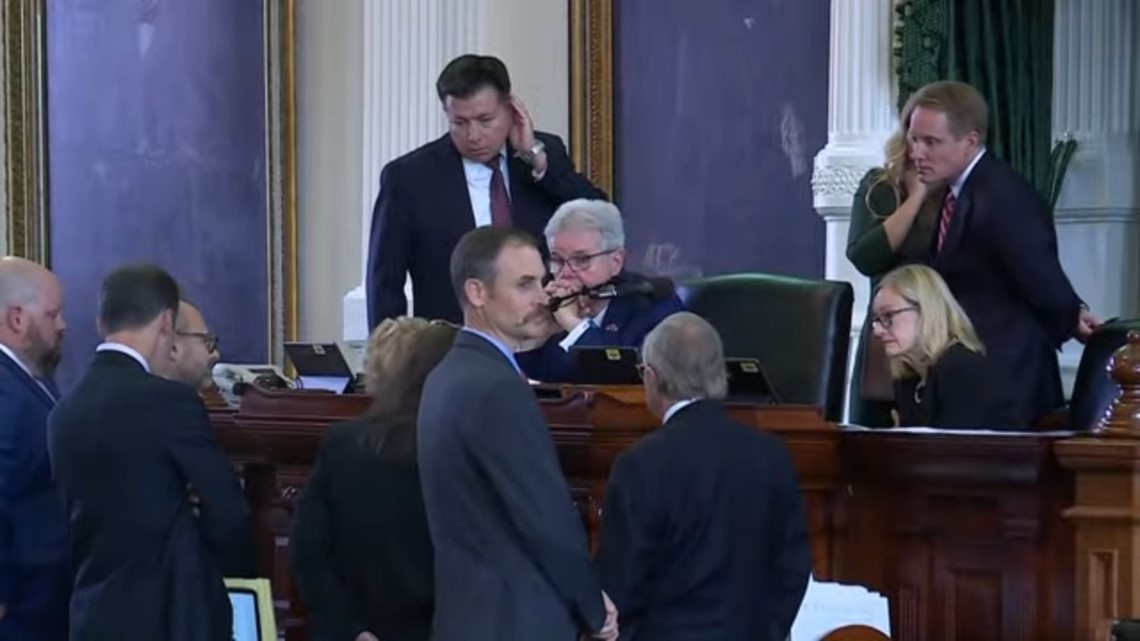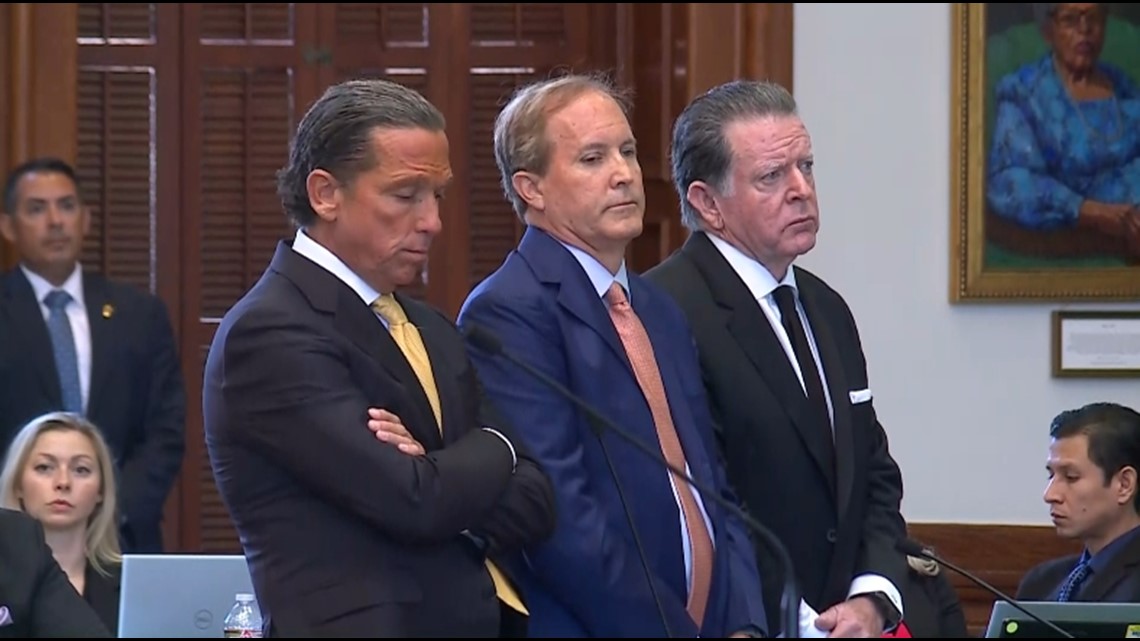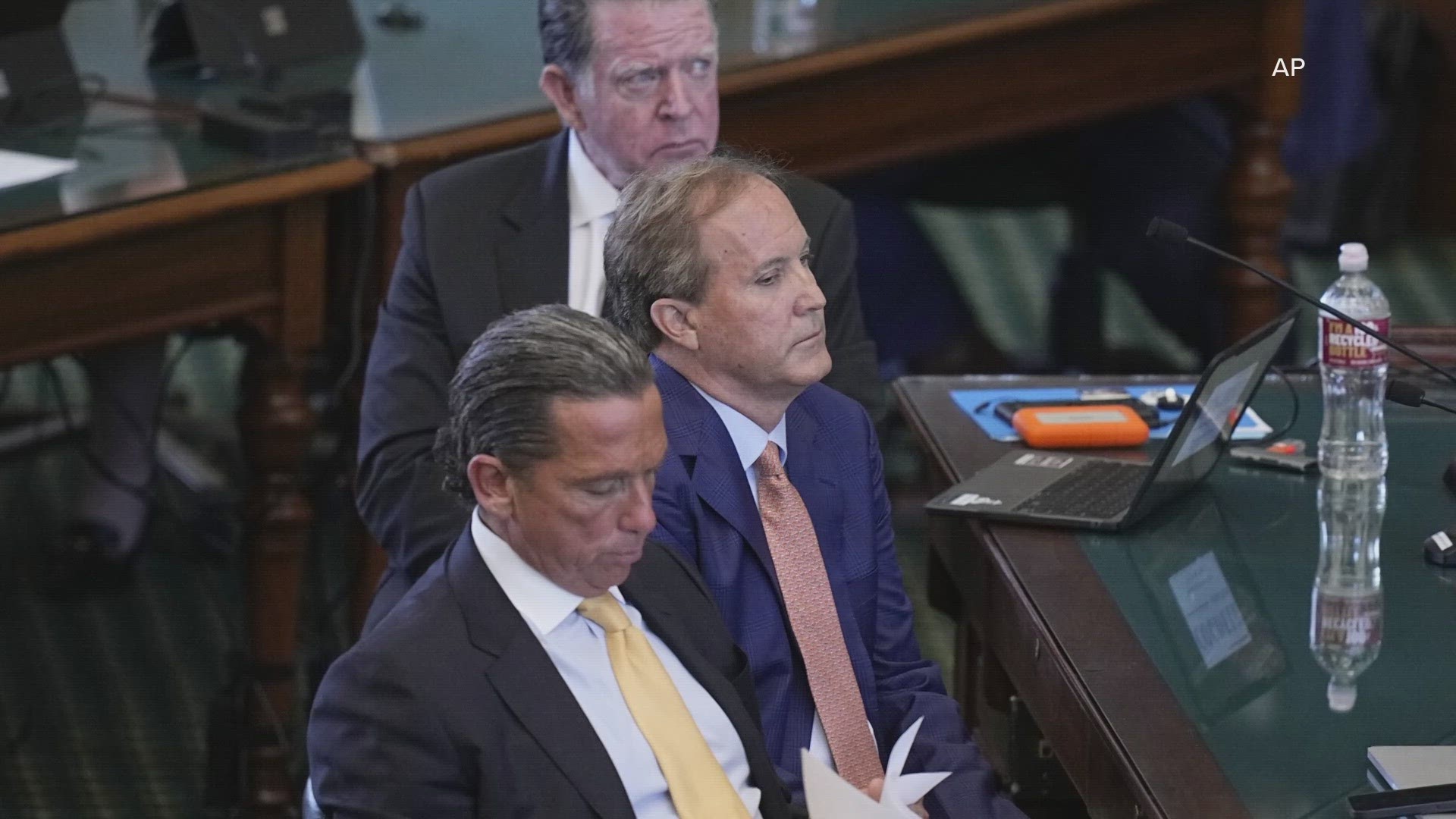AUSTIN, Texas — Suspended Texas Attorney General Ken Paxton went on trial for his impeachment Tuesday morning in Austin.
Texas State Senators are hearing 16 articles of impeachment against Paxton, who faces accusations of bribery, disregard of duty and misappropriation of public resources.
The day began with the senators getting sworn in, followed by votes on pre-trial motions, which included Paxton's attempts to get all of the articles of impeachment dismissed.
It didn't work, as all of the votes went against Paxton's motions, including a 24-6 vote against dismissing all articles of impeachments.
Paxton then had the opportunity to plead not guilty on the charges, which he did, via his attorney Tony Buzbee.
The two sides broke for lunch, but Paxton was apparently done for the day -- he didn't return to the trial after the break, which was allowed by the trial rules.
Both sides then delivered opening statements and called one witness, Jeff Mateer. Mateer's testimony was still ongoing when the two sides had to meet with Lt. Gov. Dan Patrick over privileged information admitted in court.
And that's where things left off for the day, as Patrick decided to adjourn for the day to get the privileged information sorted out.
The trial will resume at 9 a.m. Wednesday.


Here are all of the highlights from Tuesday's opening day of trial:
Former top assistant to Paxton details concerns about Nate Paul involvement
The first witness called to the stand was Jeff Mateer, Paxton's former first assistant attorney general. And the bulk of Mateer's initial testimony centered on the concerns Mateer raised with Paxton in 2020 on his potential involvement in a lawsuit case involving Nate Paul and the Mitte Foundation, a charitable organization that had a dispute with Paul.
Mateer said Paxton had planned to go argue a motion in the lawsuit in Travis County District Court, a move that Mateer described as a remarkably rare for the top lawyer in the state.
"General Paxton has some wonderful qualities, but he is not a litigator," Mateer said. "It made absolutely no sense [for him to argue in the case]. This wasn't the Google case. it wasn't the Supreme Court. It was Travis County District Court."
Mateer called it "inconceivable to me" that Paxton would appear in court in the case.
Mateer said he called a meeting with Paxton and other top assistants, urging him to "not have any further dealings with Nate Paul and let the lawyers [in the attorney general's officee] handle it."
Mateer said Paxton told him he would have no further dealings with Paul.
"It was very troubling to me that the attorney general would be willing to appear in Travis County District Court," Mateer testified. "I was very concerned why he would want to do that."
Mateer said Paxton "seemed sincere" about not dealing with Paul or the Mitte Foundation case anymore. But the next day, Mateer said he learned, Paxton was contacting other lawyers in his office about helping Paul.
Impeachment managers, Paxton lawyers trade barbs in opening statements
State Rep. Andrew Murr (R-Junction) kicked off the impeachment managers' opening statement shortly after 1 p.m. and immediately attacked Attorney General Ken Paxton's integrity, saying Paxton went "to great lengths" to hide his alleged misconduct.
"Mr. Paxton has been entrusted with great power," Murr said. "Unfortunately rather than rise to the occasion, he showed his true character."
Murr said Paxton is not fit from holding office.
"The oath of office we all took to uphold the laws of this constitution mean something," Murr said. "It's not just words on paper. It's literally an oath to God."
Murr said Paxton gave Nate Paul, the Austin real estate developer at the center of the allegations of bribery against Paxton, preferential treatment and access, and then fired his staffers when they blew the whistle.
His fired deputies were" guided by faith" by Paxton's "slow creep of corruption," Murr said.
Watch Murr's full statement here:
Houston lawyer Tony Buzbee took the podium to deliver opening statements for Paxton's side, repeatedly calling the allegations false.
Buzbee said the trial is being "fueled by a powerful lobbyist and led by a drunken speaker." Buzbee's comment was an apparent jab at Texas House Speaker Dade Phelan, whose legislative branch voted to impeach Paxton in May.
Buzbee said Paul got no preferential treatment or perks from Paxton and his office.
"One thing is clear: Nate Paul got nothing and he was very unhappy about it," Buzbee said.
Buzbee said Paxton is getting unfair treatment in the press.
"We are trying a case not here in front of you, honorable members," Buzbee said. "We're trying a case where we're being prosecuted in the press."
Watch Buzbee's and Dan Cogdell's full opening statement:
Paxton no-shows opening statements
Texas senators, Lt. Gov. Dan Patrick and attorneys on both sides of Ken Paxton's impeachment trial gathered in the Texas Senate chambers shortly after lunch Tuesday to begin opening statements.
Except Paxton wasn't there.
The suspended attorney general did not return to the trial after the hour-long lunch break. He was present for the opening of the trial Tuesday morning, and he was there when his attorney, Tony Buzbee, pleaded not guilty to all of the impeachment articles on his behalf.
But Paxton wasn't there when the parties returned from lunch.
Rusty Hardin, an attorney for the impeachment managers, questioned Patrick about why Paxton was not there, saying he should be present.
Buzbee, however, pointed out to Patrick that the trial rules called for Paxton to be at the trial at 9 a.m. Tuesday but it didn't require he be there all day. Patrick agreed that's what the rules said.
And so the opening statements began, with Paxton's seat empty.
Paxton pleads not guilty to impeachment charges
Shortly before noon, Attorney General Ken Paxton pleaded not guilty to the articles of impeachment.
Paxton's attorney, Tony Buzbee, responded to the charges on Paxton's behalf, calling the allegations "untrue" and "incorrect" and "offensive and false" each time the charges were read and Paxton was asked how he pleads.
Paxton's plea came after senators and Lt. Gov. Dan Patrick ruled on pre-trial motions, and Patrick went over the rules and parameters of the trial. Paxton's opportunity to plea was part of the procedures of the trial.
The trial was expected to break for lunch around noon, and then return with opening statements at 1 p.m.
Watch the video of Buzbee responding to the allegations:


Patrick rules that Paxton does not have to testify
Lt. Gov. Dan Patrick, who is overseeing the trial as the presiding officer in the Texas Senate, issued a win for Paxton by ruling that he cannot be compelled to testify in the trial. Patrick's ruling came on a motion from Paxton's legal team.
While many of the pre-trial motions had to be voted on by Senators -- and all of those motions went against Paxton -- Patrick was allowed to rule on a handful of motions, including the motion on whether or not Paxton should be compelled to testify.
Paxton motion to dismiss fails
Ken Paxton's legal team filed a bevy of motions to dismiss the articles of impeachment against him, but each of those motions failed in votes by senators as the trial began Tuesday in Austin.
The most overarching motion to dismiss all articles of impeachment, claiming there is no evidence, failed by a vote of 24-6.
There are 31 senators, but Paxton's wife, Sen. Angela Paxton, is not voting during the process.
Six senators voted to dismiss all articles of impeachment: Lois Kolkhorst, Paul Bettencourt, Brandon Creighton, Tan Parker, Bob Hall and Donna Campbell.
Paxton's team also had filed a motion to exclude any evidence from prior to January 2023, but that motion also failed, 22 votes to eight.
A motion to dismiss most of the charges -- 1-7, and 9-20 -- also failed 22-8. The six senators who voted to dismiss all charges were joined by Charles Perry and Charles Schwertner.
For context, there will need to be 21 votes to convict Paxton in the impeachment and remove him from office.
Paxton had more support on later votes related to dismissing individual articles of impeachment, though the votes still failed. On the motion to dismiss Article 8 -- disregard of official duty -- 20 senators voted no, and 10 voted yes.
On the motion to dismiss Article 7 -- misapplication of public resources -- and Article 10 -- false statements in official records -- 21 senators voted no and 9 voted yes.
Senators sworn in with Sam Houston Bible
Lt. Gov. Dan Patrick, who is overseeing the proceedings in the Senate, began the process of swearing in all 31 Texas state senators at about 9 a.m. Patrick did so while the senators placed their left hand on the Sam Houston Bible. As state legend goes, Sam Houston, the first president of the Republic of Texas, reportedly owned the Bible in the 1800s and gifted it to the Texas Supreme Court.
The court has used the King James Version Bible to inaugurate governor and other elected officials for over 150 years, according to the court's website.
Early scenes from Austin
Dozens of people were inside the Texas Capitol early Tuesday morning, waiting to secure a seat inside the Senate chamber for the impeachment trial. A limited number of tickets, both needed by the public and media, was being made available for the impeachment trial each day.
In fact, the first media members wanting to get a ticket arrived at 3 a.m., according to WFAA's Chris Sadeghi, who shared these updates from the Capitol:
The crowd lining up for tickets appear to lean toward support of Paxton, a Collin County Republican. Several in the crowd were wearing matching red t-shirts that with a "Rino Hunting Permit" across the front.
What is Ken Paxton accused of?
The Texas House of Representatives in May voted to impeach Paxton, a Collin County Republican who first took office in 2015. Paxton previously served as a Texas senator and representative.
Paxton's tenure has seen several legal matters and controversies involving him, including the shadow of a state securities fraud case in which he was indicted in Collin County in 2015. Paxton has yet to face trial in the indictment, though the case has not been closed.
But Paxton's impeachment centers on his alleged involvement with Austin real estate developer Nate Paul, who faces eight counts of making false statements to financial institutions.
Paul, 36, allegedly overstated his assets and understated his liabilities to fraudulently obtain loans, according to a 23-page indictment filed by federal prosecutors in June.
Paxton was not mentioned in Paul's indictment, and he does not face charges in the case.
But Paxton faces 20 articles of impeachment, including disregard of duty, obstruction of justice, constitutional bribery and misappropriation of public resources, many of which are tied to his alleged involvement with Paul.
A document dump from the Texas House impeachment managers earlier this month provided details on how Paxton allegedly abused his office to help Paul, according to the Texas Tribune.
It's unclear how long the impeachment trial will last, though it could be up to several weeks. It's also not clear if Paxton will testify.
He is listed as one of several dozen witnesses, but that doesn't mean he'll testify.
How does the Ken Paxton impeachment trial work?
It's important to remember Paxton is facing a political trial, not a criminal trial. So the proceedings might not look like what you're used to seeing in a courtroom.
First, it is important to know how members of the Texas Legislature will play a part.
- Lt. Gov. Dan Patrick is the presiding officer of the court of impeachment, or judge.
- The lone defendant in the impeachment trial is Warren Kenneth “Ken” Paxton.
- The House Board of Managers are the prosecutors.
- The jury is all members of the Texas Senate who are present and eligible to vote with a "yes" or "no."
- Angela Paxton, state senator and wife of impeached Ken Paxton, is ineligible to vote due to a conflict of interest. She is required to attend the trial, but may not vote on any matters, motions, questions or participate in closed-session deliberation.
- The senate sergeant at arms will act as bailiff, while the secretary of the senate will serve as the clerk.
Prior to the trial, all pre-trial motions and answers are submitted in writing to Patrick. From there, he sends them to a special committee on rules and procedures for court of impeachments. This committee consists of five members who make recommendations on all motions and amendments.
Like in regular trials, Paxton has rights as a defendant. Paxton is required to attend the trial; however, he is not required to take the stand to testify. He or his attorneys may enter a plea, but if a plea is not made, the Senate will move forward with a plea of “not guilty.”
The witness list has been made confidential; however, we do know that no member of the court (senator) or presiding officer may be called or volunteer as a witness – unless the evidence is relevant.
Patrick will swear in each person, and no witness can listen to the testimony of other witnesses. Witnesses cannot talk to each other about the trial and, much like regular trials, cannot read reports, watch television or look at social media.
Witnesses will only be examined by one person on behalf of the other party, and there are strict time limits in place. Both the defense and prosecution have 60 minutes allotted for opening statements and 24 hours of presentations. A witness may only be cross-examined for 60 minutes, and the same amount of time is given for rebuttal evidence per side. If there is a conviction, 15 minutes will be given, per side, to discuss whether Paxton would be disqualified from holding a future position in office.
When it comes to the verdict, there are three main differences between an impeachment trial and a criminal trial. If Paxton is found guilty by the Senate jury, he will be removed from his position in office as the state’s attorney general. He would not be imprisoned. In an impeachment trial, Gov. Greg Abbott cannot pardon Paxton. Additionally, a not-guilty verdict would mean Paxton can return to work. This, however, would not preclude him from facing charges in a court of law. Senators, the jury, will vote on each individual article of impeachment. The vote can only be "yes" or "no" and cannot be changed once they are made. All votes are cast without debate or comment.

